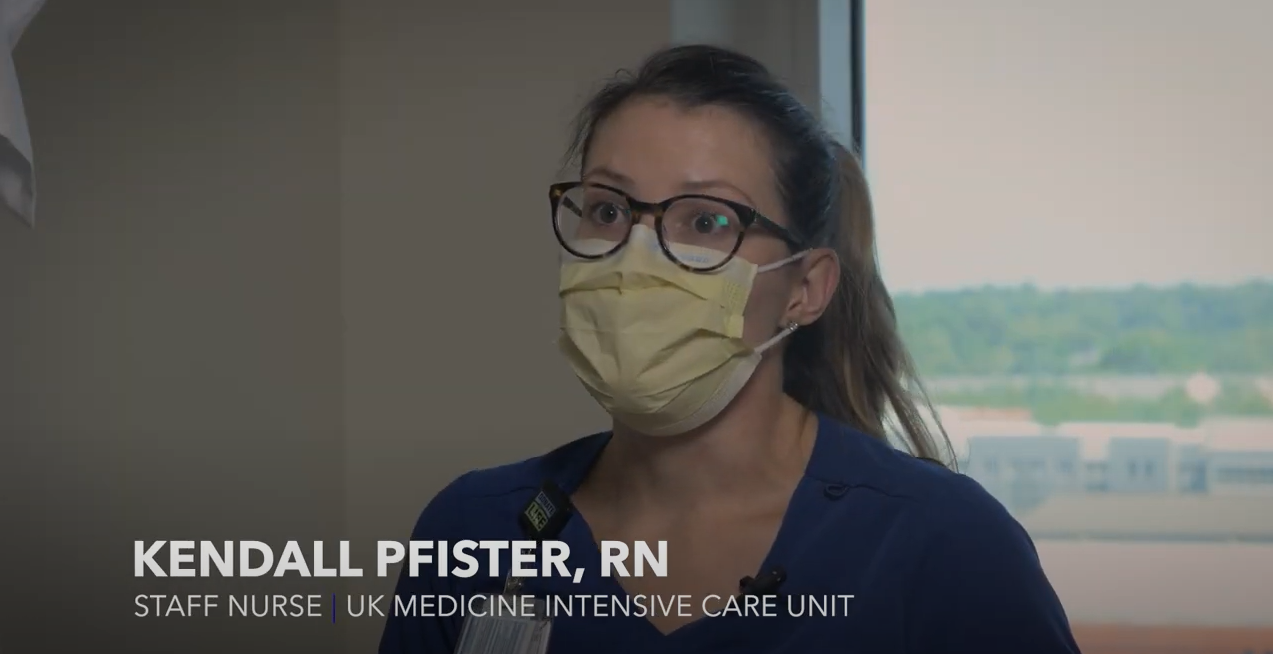Voices from the Front Lines: Kendall Pfister

We recently joined hospital staff for a few days to document the reality of treating COVID-19 patients in UK HealthCare clinical settings.
This edited interview is part of our ongoing series, “UK HealthCare: Voices from the Front Lines,” highlighting stories and perspectives from our frontline staff who have been caring for the sickest COVID-19 patients since March 2020.
Kendall Pfister, RN, has worked in the UK HealthCare MICU for about three years.
What has this new wave of COVID been like in the MICU?
You come into the report room and see what the ICU has, patient-wise. I would always start out with two stable, probably not on the breathing machine patients, and not even on any drips to keep their blood pressure up. And now when you come in (you might have) two patients on the breathing machine. So, it's pretty intense from the get-go and you’ve got to learn fast, and it's not easy. And these patients can decline very fast; you don't anticipate it. And, that's just COVID.
Can you describe how this wave has been compared to last year?
First off, the numbers are higher than even the first (wave) that happened. And the average age of people is way lower. We're seeing people (in their) 20s, 30s, pregnant women — way more pregnant women.
We've done several emergency C-sections. And people are truly sicker. We have prone teams literally going around the unit, turning people — there's that many people requiring that. And then, there's people that we have up here that need ECMO (a therapy that takes blood out of a patient’s body, adds oxygen, and returns it to the body).
Is there a particular experience with a patient during COVID that stands out to you?
In the previous waves, (a man arrived) and as soon as he got here, (he was) put on continuous dialysis, put on deep sedation and then medically paralyzed. When I came back, two days later, he was on three blood pressure medicines to keep his blood pressure up. When I got here that day, his vital signs were declining.
So, (he was) on all of those medicines that should theoretically keep you alive and keep your body going. His body passed away on everything. And he died laying on his belly. He was just too unstable to turn over.
What keeps you motivated to continue this fight?
I really love the ICU. I really love critical care. It takes a lot to pick up on small changes that could result in a big emergency and be able to prevent those, and think on your feet and think fast. But, our coworkers are incredible. Everyone's a huge team up here. This is so hard and you truly can't do it without them. Everyone's so dedicated to giving the best care we can in this type of situation.
What is the most important thing, want people to understand about what's happening here in the hospital?
It's real, it's scary. There's people coming in who are unvaccinated. They're very young maybe or tentative because of information that's put out there, but ended up here, fighting for their life. And the last thing that they did out in the world was just living their life, (and) they thought they'd be OK. But now they're here and that's the last memory, and that's actually pretty wild to think about… Just get vaccinated.




